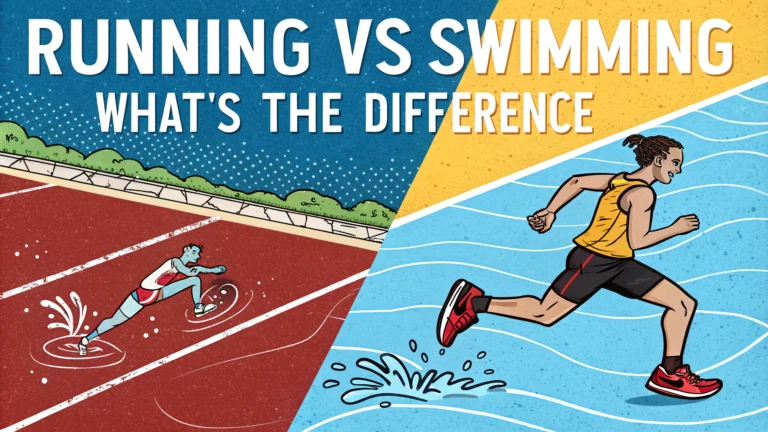Two of the most **popular cardio exercises** often spark debate among fitness enthusiasts. Each activity offers unique benefits for your health and fitness goals, making the choice between running and swimming more complex than it might seem at first glance.
The decision between hitting the pool or lacing up running shoes depends on factors like your **fitness level**, **joint health**, and **personal preferences**. Understanding the key differences helps you make an informed choice that aligns with your workout goals.
Understanding the Impact on Your Body
Swimming stands out as a **low-impact** full-body workout that puts minimal stress on joints. Running, while more accessible, creates higher impact but excels at building bone density and lower body strength. Consider these key differences:
- **Joint Impact**: Swimming – minimal; Running – moderate to high
- **Muscle Groups**: Swimming – full body; Running – lower body focus
- **Calorie Burn**: Both effective, varies by intensity
Comparing Workout Efficiency
Different energy systems and muscle recruitment patterns affect how each exercise benefits your body:
| Aspect | Swimming | Running |
|---|---|---|
| Calories/30 min | 250-350 | 280-400 |
| Skill Level Required | High | Moderate |
| Equipment Needed | Pool access, swimwear | Running shoes |
Accessibility and Practical Considerations
The choice between running and swimming often comes down to practical factors:
- **Location**: Running requires only open space, while swimming needs pool access
- **Weather Impact**: Running affected by weather, swimming typically indoor activity
- **Time Management**: Running offers more flexibility in scheduling
- **Initial Investment**: Running requires less equipment and facility costs
The Role of Recovery and Injury Prevention
Understanding proper **recovery techniques** helps prevent common injuries in both activities:
- **Stretching**: Essential for running, less critical for swimming
- **Rest Days**: Both activities need 1-2 rest days weekly
- **Cross-Training**: Combining both activities reduces injury risk
Training Programs and Progress Tracking
Different methods track progress in each activity:
| Metric | Swimming | Running |
|---|---|---|
| Distance Progress | Lap counting | GPS tracking |
| Speed Monitoring | Splits per lap | Pace per mile/km |
| Performance Goals | Stroke efficiency | Race times |
Mental Health Benefits
Each exercise offers unique **psychological advantages**:
- Swimming provides meditative state through water immersion and breathing patterns
- Running releases endorphins through rhythmic movement
- Both activities reduce stress and improve sleep quality
“The best exercise is the one you’ll stick with consistently.”
Making Your Final Decision
Consider these factors when choosing between running and swimming:
- **Physical Condition**: Current fitness level and any existing injuries
- **Available Resources**: Access to facilities and equipment
- **Time Commitment**: Available schedule for training
- **Personal Goals**: Weight loss, endurance, or overall fitness
For optimal results, try both activities for two weeks each. This hands-on experience helps determine which exercise better fits your lifestyle and goals. Remember that combining both activities through **cross-training** often provides the most balanced fitness approach.
Running vs Swimming FAQs
General Comparison FAQs
Q: Which burns more calories – running or swimming?
A: Swimming typically burns 500-700 calories per hour while running burns 600-800 calories per hour at moderate intensity. The exact amount depends on intensity, body weight, and technique.
Q: Is swimming or running better for weight loss?
A: Both are effective for weight loss. Running may burn slightly more calories, but swimming provides a full-body workout with less impact on joints. The best choice depends on individual fitness goals and physical condition.
Q: Which is better for beginners – running or swimming?
A: Running requires less technical skill to start, making it more accessible for beginners. Swimming demands proper technique and may require lessons, but offers lower impact on joints.
Specific Benefits & Comparisons
Q: What muscles does swimming work vs running?
A: Swimming works:
- Upper body (shoulders, back, arms)
- Core muscles
- Leg muscles
Running primarily targets:
- Leg muscles
- Core muscles
- Hip flexors
Q: Which exercise is safer for joints?
A: Swimming is lower impact and safer for joints due to water’s buoyancy. Running creates more impact, especially on knees and ankles.
Training & Performance FAQs
Q: Can swimmers be good runners and vice versa?
A: Yes, but each sport requires specific training. Cross-training between both can improve overall fitness and reduce injury risk.
Q: What’s the difference in breathing technique between swimming and running?
A: Swimming requires coordinated breathing with strokes and head turns, while running allows natural breathing patterns. Swimming demands more breath control.
Equipment & Cost Comparison
Q: Which sport is more expensive – running or swimming?
A: Running typically costs less, requiring only good shoes and clothing. Swimming needs pool access, swimwear, goggles, and possibly membership fees.
Health-Specific FAQs
Q: Which is better for asthma – swimming or running?
A: Swimming is often better for asthma due to humid air and horizontal position. The moist environment helps reduce exercise-induced asthma symptoms.
Q: Does running or swimming build more endurance?
A: Both build endurance effectively. Running typically builds land-based endurance faster, while swimming develops unique cardiovascular adaptations.
Q: Which is better for back pain – running or swimming?
A: Swimming is generally better for back pain as it provides support and reduces spinal compression. Running can aggravate existing back issues.
Q: How do recovery times compare between swimming and running?
A: Swimming typically requires less recovery time due to lower impact on joints and muscles. Running often needs more recovery time, especially after intense sessions.



















